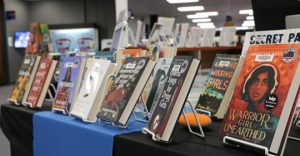
Indigenous book display in the BCIT Library.
A hot topic at library conferences has been “Decolonizing the Collection.” This is shorthand for some very technical, intensive, and necessary changes that need to be made to our database(s). Library cataloguing in North America is based on Library of Congress Subject Headings (LCSH) that were started in the late 19th century and have evolved slowly since then. This comprehensive and structured vocabulary list, used for cataloguing and indexing in libraries, is inherently problematic but also very useful for libraries worldwide, making it an essential tool for resource discovery and subject access.
Despite its widespread use, LCSH has faced criticism for its historical biases and limitations. The system reflects a Western-centric perspective, and its controlled vocabulary does not adequately represent marginalized communities or emerging disciplines. Nonetheless, LCSH remains a vital tool for libraries and information professionals, and efforts are ongoing to make it more inclusive and representative of diverse perspectives.
Library & Archives Canada (LAC) has written some strategies and initiatives, as part of their Indigenous Heritage Action Plan, based on United Nations Declaration on the Rights of Indigenous Peoples (UNDRIP), “we will adapt the words we use to describe LAC collections related to First Nations, Inuit and the Métis Nation to enhance access and to ensure a culturally appropriate and respectful approach.” While LAC has made some progress LCSH has made very little. The interconnected, standardized, and digital nature of library cataloguing makes waiting for LCSH the easy route. However, libraries have gotten tired of waiting.
Library workers don’t let our tiredness get us down, instead, we find ways to act. A small but dedicated team in the BCIT Library is working to decolonize our catalogue. Using an Excel spreadsheet of almost 1100 problematic terms found in our catalogue, the work done by the Great Victoria Public Library, Xwi7xwa Library at UBC, and Canadian Research Knowledge Network, we are meticulously combing through the problematic terms and finding appropriate updated, and respectful replacement terms. Once the initial groundwork is complete, we will consult with BCIT Indigenous Initiatives about the exact terms chosen.
You will hear from me again when we launch these changes. The change for BCIT Library patrons will be seamless. Behind the scenes will be a great deal of upkeep and monitoring as digital titles arrive in our Collections all of the time with LCSH terms automatically embedded. Because of the way Library Management Software works LCSH will still be in the system. However, rather than display offensive terms the system will ping the final spreadsheet we create display the updated term(s). Library patrons will be able to use the hyperlinked Subject Heading as they normally would to find related materials. In the end, creating and maintaining this spreadsheet will make it easier for us to update and manage the needed changes to our Subject Headings.
The BCIT Library is striving to be a more inclusive and welcoming space for all. Decolonizing the catalogue is just one of the goals that we are working towards. Thanks to Cindy Chang, François-Xavier Paré, Jarrett Seto, and Cindy McLellan.
A version of this post was previously published on the BCIT FSA blog in June 2024. At that time I had several requests for examples so people could have a better understanding. I have included a couple examples below.
Please be aware that in order to include examples I have taken terms that you will still find in search results or library materials, which reflect the authors attitude or that of the period in which the item was created or catalogued and those terms are considered offensive.
An example of an official Library of Congress Subject Heading (LCSH) still in use:
Haida Indian women.
Essentially removing the word “Indian” will make a more accurate, useful, and respectful Subject Term:
Haida – Women.
A second example of an official LCSH still in use today:
Indian children.
This will be updated to:
Indigenous children OR First Nations children
These changes are long overdue and will help to improve search and to our resources.